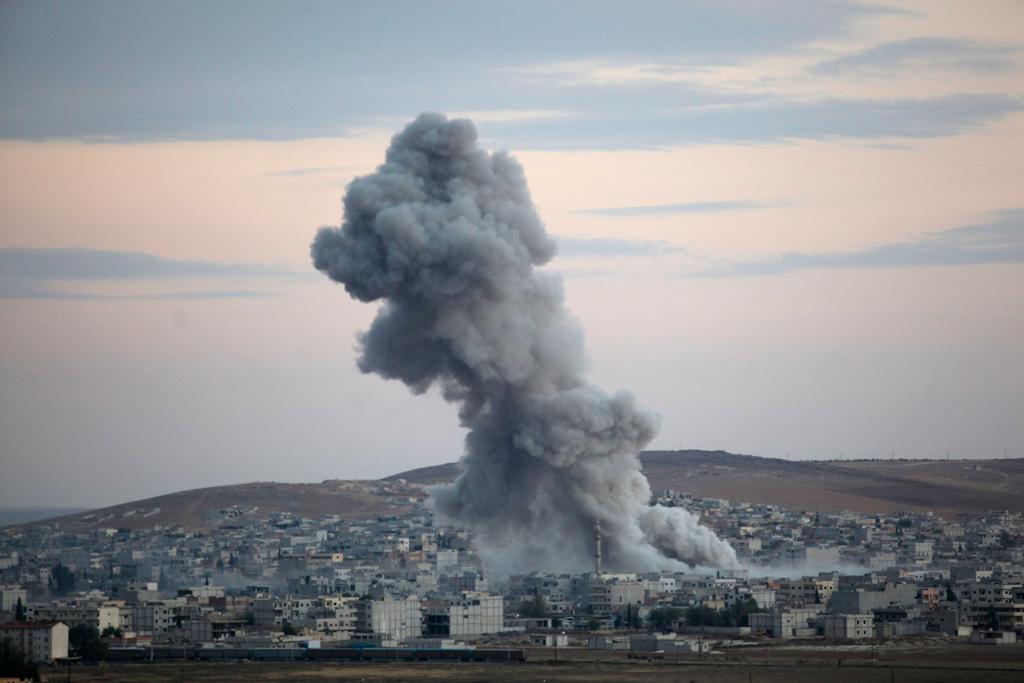Fiercest fighting in days hits Syrian border town
Heavy smoke rises following an airstrike by the US-led coalition in Kobani, Syria, as seen from the outskirts of Suruc, on the Turkey-Syria border, Oct. 18, 2014.
URFA, Turkey — The fiercest fighting in days shook the Syrian border town of Kobani overnight, sources inside the town and a monitoring group said on Sunday, as Islamic State militants attacked Kurdish fighters with mortars and car bombs.
Islamic State, which controls much of Syria and Iraq, fired 44 mortars at Kurdish parts of the town on Saturday, some of which fell inside Turkey, according to the British-based Syrian Observatory for Human Rights. It said four more were fired on Sunday.
The month-long battle for Kobani has ebbed and flowed. A week ago, Kurds warned the town would fall imminently and the US-led coalition stepped up air strikes on Islamic State, which wants to take Kobani to consolidate its position in northern Syria.
The coalition has been bombing Islamic State targets in Iraq since August and extended the campaign to Syria in September after Islamic State, a group that espouses a rigid interpretation of Islam and initially focused on fighting Syrian President Bashar al-Assad's forces, made huge territorial gains.
Raids on Islamic State around Kobani have been stepped up, with the fate of the town seen as an important test for US President Barack Obama's campaign against the Islamists.
NATO member Turkey, whose forces are ranged along the border overlooking Kobani, is a reluctant member of the coalition, insisting the allies should also confront Assad to end a civil war that has killed close to 200,000 people since March 2011.
"We had the most intense clashes of days, perhaps a week last night. [Islamic State] attacked from three different sides including the municipality building side and the market place," said Abdulrahman Gok, a journalist in Kobani.
"Clashes did not stop until the morning. We have had an early morning walk inside the city and have seen lots of damaged cars on the streets and unexploded mortar shells," he said.
Car bombs
The Observatory reported two Islamic State car bombs hit Kurdish positions on Saturday evening leading to casualties. A cloud of black smoke towered over Kobani on Sunday.
A fighter from the female units of the main Syrian Kurdish militia in Kobani, YPG, said Kurdish fighters were able to detonate the car bombs before they reached their targets.
"Last night there were clashes all across Kobani … this morning the clashes are still ongoing," she said, speaking on condition of anonymity.
The Observatory said 70 Islamic State fighters had been killed in the past two days, according to sources at the hospital in the nearby town of Tel Abyab, where Islamic State bodies are taken. Reuters cannot independently confirm the reports due to security restrictions.
The Observatory said some Syrian Arab fighters from the Revolutionaries of Raqqa Brigade, which are fighting alongside Kurdish fighters, had executed two Islamic State captives.
"One was a child of around 15 years old. They shot them in the head," he said.
Islamic State have also used executions throughout their campaigns in Syria and Iraq, killing hundreds of their enemies and civilians who are opposed to their cause, according to Islamic State videos and statements.
Hundreds of thousands have fled their advance. Turkey hosts about 1.5 million Syrian refugees, including almost 200,000 Syrian Kurds from Kobani.
Ankara has refused to rearm beleaguered Kurdish fighters, who complain they are at huge disadvantage in the face of Islamic State's weaponry, many of it seized from the Iraqi military when it took the city of Mosul in June.
Turkey views the YPG with suspicion for its long-standing links with the Kurdistan Workers Party (PKK), which has waged a 30-year armed campaign for self-rule in Turkey.
President Tayyip Erdogan was quoted in the Turkish media on Sunday as saying Ankara will never arm the YPG through its political wing, the PYD.
"There has been talk of arming the PYD to establish a front here against the Islamic State. For us, the PYD is the same as the PKK, it’s a terrorist organization. It would be very, very wrong to expect us to openly say ‘yes’ to our NATO ally America giving this kind of support. To expect something like this from us is impossible," he was quoted as saying.
This stance has sparked outrage among Turkey's own Kurds, who make up about 20 percent of the population. Riots in several cities earlier this month killed more than 35 people.
(Additional reporting by Hamdi Istanbullu in Mursitpinar, Ayla Jean Yackley in Istanbul and Oliver Holmes in Beirut; Editing by Giles Elgood)
Every day, reporters and producers at The World are hard at work bringing you human-centered news from across the globe. But we can’t do it without you. We need your support to ensure we can continue this work for another year.
Make a gift today, and you’ll help us unlock a matching gift of $67,000!
